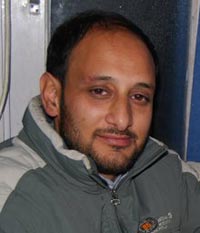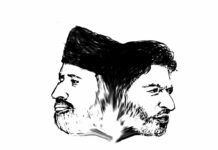Khursheed Wani
 On November 25, about two months after Syed Ali Geelani turned 86, an exceptional gift was offered to him by a bevy of his comrades. They cited Geelani’s “unshakable, steadfast, uncompromised and active leadership” to appoint him as the lifetime Chairman of his faction of Hurriyat Conference. By implication, curtains were drawn on a process that was symbolically seeking to reinstate the top man every three years.
On November 25, about two months after Syed Ali Geelani turned 86, an exceptional gift was offered to him by a bevy of his comrades. They cited Geelani’s “unshakable, steadfast, uncompromised and active leadership” to appoint him as the lifetime Chairman of his faction of Hurriyat Conference. By implication, curtains were drawn on a process that was symbolically seeking to reinstate the top man every three years.
In the past 12 years, since Geelani floated his own grouping, his position as its head remained unopposed and intact. Is it not interesting as to why he and his companions, some of whom have recently renewed their camaraderie to Geelani camp, insisted on declaring him as their lifetime chief? The age could be one factor.
The development did not evoke much public debate, to say, matter-of-factly. This is quite contrary to the situation when Geelani had declared himself the leader of Kashmiri nation in the afternoon of August 18, 2008 in front of a mammoth public gathering at Tourist Reception Center Grounds in Srinagar. It evoked commotion, and Geelani was compelled to retreat his pronouncement as “slip of tongue”. Seven years down the line, his similar pronouncement, in a fragment of pro-freedom camp, is lacking the stirring effect.
This leads to the fact that fragments of pro-freedom camp have concretized in their own shape and size. The faction led by Mirwaiz Umar Farooq reflects the same state of affairs. Mirwaiz too is virtually the lifetime head of this faction, a position he re-attained after replacing Molvi Abbas Ansari, shortly after their first round of talks with Government of India in 2003.
Yasin Malik is comfortable in maintaining a safe distance from both the factions. If some situation throws the separatist leaders into relevance, like when foreign secretary level talks between India and Pakistan were called off or Pakistan’s National Security Advisor Sartaj Aziz last minute cancelled his travel to New Delhi, Malik was sought-after for comments as Geelani and Mirwaiz were.
The new placements in Geelani’s faction are also interesting. Shabir Shah, Nayeem Khan and Agha Syed Hassan were previously with Mirwaiz. Shah and Khan deserted Mirwaiz two years ago and floated their own faction of Hurriyat but that gained little currency. Ultimately, this summer they joined Geelani and brought Hassan along. Now, Shabir Shah has been nominated Secretary General while jailed leader Masarat Alam would be his deputy. Alam’s reaction has not come to fore but a perception goes that his position has been diminished. Arguably, post 2008, Alam has been the most influential separatist leader who has enjoyed only 40 days of freedom during the past seven years. Interestingly, several years ago, Geelani had nominated Alam and Ashraf Sehrai, an old confidante, as his political heirs. To utter surprise, Sehrai doesn’t figure in his new team. And, Jamat-e-Islami, which was the backbone of Geelani’s Hurriyat has chosen to remain aloof.
Nayeem Khan doesn’t belong to Jammu but has been nominated as “provincial head” for the region, just to float an impression that Hurriyat also exists in Jammu. More astonishingly, Shia cleric Agha Hassan has been appointed “provincial head for Kargil and Ladakh”. The Hurriyat doesn’t know Kargil is part of Ladakh like Leh and the area has not attained the provincial status administratively. Even Omar Abdullah spurned the demand to appoint a separate DIG for Ladakh. Hassan’s appointment is a sad commentary on Hurriyat’s understanding of the region.
There are many theories on the new alignments in the Geelani camp, Pakistan factor being one of them. However, the fact is that since 1993 when the 23-party amalgam Hurriyat Conference had emerged as the recognized address of the ‘freedom movement’, over the years, it has lost efficacy with perpetual fragmentation.
– Khursheed Wani is a journalist















